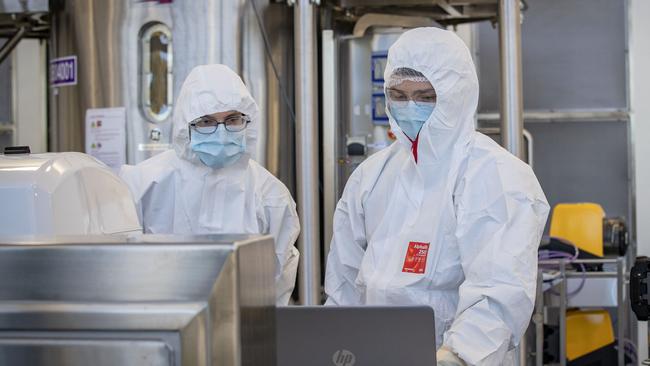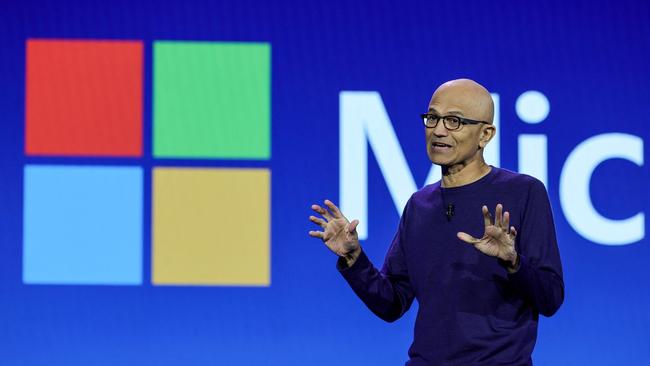10 top stocks to buy, from 10 top fund managers
Leading fund managers share their high-performance stock tips for this year and beyond across Australian and global companies.
Business
Don't miss out on the headlines from Business. Followed categories will be added to My News.
Health care, technology and fast cars feature prominently in some of Australia’s top investment specialists’ stock tips for 2024.
Ten fund managers have shared their top picks in a year that is expected to be challenging for markets overall after a strong end to 2023.
All of the fund managers are generous too, working pro bono for listed investment companies Future Generation Australia and Future Generation Global, which combine investment and social returns.
The managers waive the usual fees so 1 per cent of assets are donated to charity – so far delivering about $76m to non-profit groups supporting youth at risk and youth mental health.
Here are their top tips, spanning Australian and international shares, and why they believe their chosen stocks are a good long-term buy.
CSL
Australia’s largest health-related stock has rewarded investors richly for decades, and Blake Henricks from Firetrail Investments is positive about the company.
“CSL was a Covid loser as collection costs rose,” said Mr Henricks, portfolio manager of the Firetrail Australian High Conviction Fund.
“But we have seen CSL’s margin turn around as plasma collection volumes have improved and costs are dropping,” he said.
“When we compare CSL to other defensive options it becomes even more attractive to us, as it is trading cheaper to peers and relative to its own long-term average, and consensus has earnings growth in the mid-teens.”

MICROSOFT
US tech giant Microsoft is almost 50 years old and Magellan Asset Management’s CFA portfolio manager, Nikki Thomas, said much had changed in that time at the company and in its markets.
“But what hasn’t changed is its incumbency with enterprises and its ability to keep finding the future revenue growth opportunities and lead change,” she said.
“The shift to the cloud has been fuelling growth for Microsoft Azure in particular, and we see this continuing for many more years at a compound double-digit rate of growth.”
Ms Thomas said Microsoft’s Office 365 had a highly recurring subscription revenue stream, and AI delivered an opportunity to unlock greater productivity.
“There are other opportunities for Microsoft too – from gaming to chips and it partners with other companies to expand opportunities,” she said.
“Its balance sheet is robust and rich cash flow generation gives it firepower to invest strategically and support strong shareholder returns.
“We also hold CEO Satya Nadella, and his leadership team, in high regard.
“Despite its immense size, we continue to see strong growth at Microsoft for many, many years.”
FERRARI
Want an investment that roars? Like Microsoft, Ferrari is listed on the New York Stock Exchange and its shares can be bought by anyone wanting a piece of prancing horse.
Fund manager Martin Currie’s head of global long term unconstrained equities, Zehrid Osmani, said the company had strong industry positioning in the high-end car market.
It typically had a 30-50 per cent price premium to peer sports car brands, Mr Osmani said.
“Long waiting lists for products makes the company able to weather short term cyclical headwinds, and be able to continue to optimise its production capacity in downturns, making its sales more predictable over the long term,” he said.
“The recent launch of an SUV has already ran into waiting lists of well over one year, and is helping the company address an important car market segment.
“Ferrari has more predictable sales than the market expects, and therefore can be seen as a consumer staples, albeit if only a staples of the high-net-worth individual.”
RESMED
This Aussie company designs and makes CPAP systems that treat sleep apnoea, a debilitating illness affecting hundreds of millions of people worldwide.
Lanyon Asset Management portfolio manager Nick Markiewicz said ResMed shares had been sold off significantly in recent months amid fears around the potential impact of new obesity drugs on demand for CPAP systems.
“While it is possible these drugs will have a marginal impact on ResMed over time, we think this threat is small, and more than reflected in the share price,” Mr Markiewicz said.
“We think an opportunity to own ResMed exists partly on account of the company’s dual-listing, with the majority of shares traded in the US, where ResMed is potentially less familiar to investors and the quality of the business is under appreciated,” he said.
“ResMed has a dominant position in an under-penetrated market with a long runway for growth for many years to come. We think the recent sell-off has provided a rare opportunity to buy a stake in one of the best businesses in Australia at its cheapest valuation level in seven years.”

WISETECH GLOBAL
This company combines two hot sectors – technology and logistics – and Sage Capital portfolio manager Kelli Meagher said its recent heavy falls reflected market attention on weaker freight volumes.
“We believe this is a short-term cyclical headwind which creates a great opportunity to invest in a company with a near monopoly in seaborne logistics among top global freight forwarders,” Ms Meagher said.
“It’s no coincidence the most profitable freight forwarders all use Wisetech’s Cargowise software,” she said.
WiseTech’s competitive advantage in global logistics should enable it to deliver good growth for many years, Ms Meagher said.
“Over more than a decade Wisetech has invested to bring online almost all major markets in single software solution, giving it scale local competitors cannot match,” she said.
“A new area where this really shines is in customs, a market potentially bigger than core freight forwarding.
“Wisetech is years ahead of the competition here.”
JOHNS LYNG
QVG Capital portfolio manager Chris Prunty said he loved the management and corporate culture of this company.
“Johns Lyng is an insurance builder, disaster recovery expert and strata manager,” he said.
“These are not exactly sexy industries, but they do benefit from being fragmented, non-cyclical and cash generative.
“The founder Scott Dider owns almost 18 per cent of the company and three other directors are also top 20 shareholders.”
Mr Prunty said the “secret sauce” behind Johns Lyng was its ability to identify highly-motivated, high-energy managers and give them a high degree of autonomy.
“We think the relatively low competitive intensity of Johns Lyng’s businesses combined with a unique corporate culture makes it a very attractive long-term holding,” he said.
SIGMA PHARMACEUTICALS
Wilson Asset Management lead portfolio manager Oscar Oberg said the pharmaceutical wholesaler and retailer recently raised $400m to merge with retailer Chemist Warehouse.
“Once the merger is approved, the combined business will transform Sigma from an $800m small cap company to a $9bn large cap company with an exciting domestic and offshore growth profile ahead of it,” Mr Oberg said.

“Chemist Warehouse has over 600 franchised pharmacies across Australia and over the last 50 years has transformed the pharmacy sector by focusing on value,” he said.
“We see the potential for Chemist Warehouse to accelerate its offshore store rollout in New Zealand, Ireland and China where the company has only 54 stores.
“Historically in the Australian market we have seen companies like Dominos and Lovisa trade at a higher valuation as they embark on an aggressive store roll out strategy.”
BAIDU
China’s dominant search engine has 663 million monthly active users.
Antipodes Partners portfolio manager John Stavliotis said the deployment of a conversational AI bot across its platform had increased traffic and attracted more advertisers.
“Baidu’s longstanding AI investments also enhance its leadership in the cloud market which will accelerate its revenue growth outside of core search,” Mr Stavliotis said.
“Baidu has addressed semiconductor export restrictions into China via inventory management and sourcing locally designed and manufactured alternatives,” he said.
“The Chinese macro environment has presented investors with an attractive PE multiple of 12x for a business with strong competitive positioning in its home market and with durable growth opportunities.”
COG FINANCIAL SERVICES
This company owns the largest SME finance broker network in Australia, with a 21 per cent market share of net assets financed.
“These brokers help secure financing for small and medium size businesses across Australia,” said Sandon Capital founder and chief investment officer Gabriel Radzyminski.
“COG also owns businesses that provide novated leasing and is building its commercial insurance brokerage network,” he said.
Mr Radzyminski said the company offered strong growth prospects over many years, and had an attractive dividend yield near 6 per cent.
“COG grows both organically and by making acquisitions,” he said.
“We also believe the sector could grow significantly if major banks decide to direct a greater share of their SME financing through broker channels.
“Industry estimates suggest about a third of SME finance is brokered, with the balance directly from the banks.”
CRH
The largest building products business in North America has a market capitalisation of around $US45bn ($67bn), said L1 Capital senior investment analyst Amar Naik.
“Despite its size, it has flown under the radar for US investors as it has been European listed until late September 2023 when its primary listing was changed to the NYSE,” he said.
“We think this change will step-change its investment profile with key U.S. investors.”
Mr Naik said CRH had outlined a pathway to double-digit earnings growth over the medium term, but it traded at a huge discount to its US peers.
“CRH is a significant beneficiary of the unprecedented growth in US infrastructure spending, which will underpin many years of robust demand,” he said.
Originally published as 10 top stocks to buy, from 10 top fund managers





